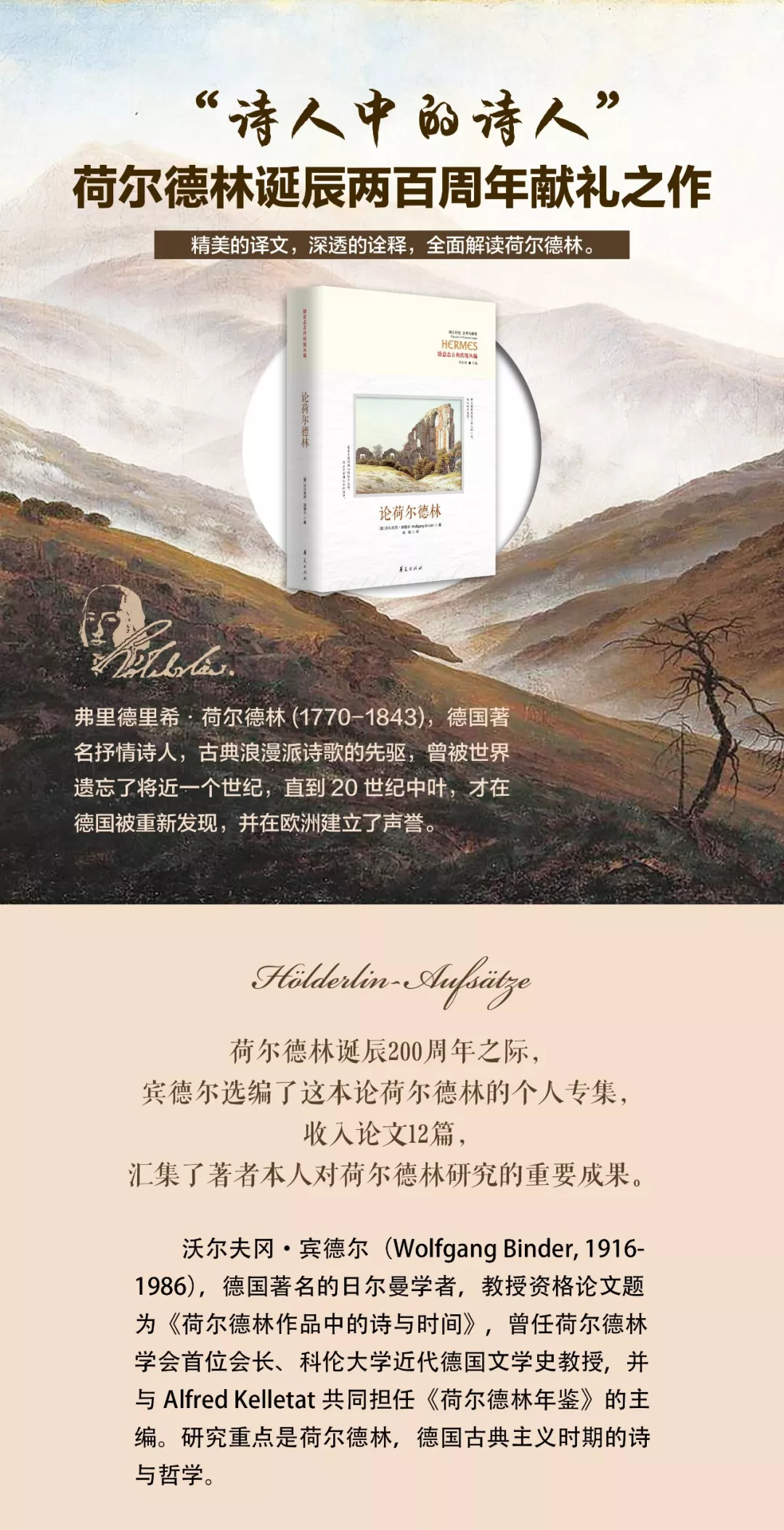海德格尔读诗录音:荷尔德林《伊斯特河》
经典与解释 2019-12-10


海德格尔朗诵荷尔德林《伊斯特河》
选自电影《伊斯特河》
The Ister-Holderlin Friedrich
Now come fire!
Eager are we to see the day
And when the trial
has passed through our knees,
May someone sense the forest's cry
We, however, singing from the Indus
Arrive from afar and
From Alpheus, long have
We sought what is fitting,
Not without wings may
Someone grasp what is nearest
Directly
And reach the other side
Here, however, we wish to build.
For rivers make arable
The land. Whenever plants grow
And there in summer
The animals go to drink,
So human goes there too.
This one, however, is named the Ister
Beautiful he dwells.
The foliage of the columns burns
And stirs. Wild they stand
Erect among one other; above
A second measure, from rocks,
The roof just out. Thus it surprises
Me not, that he
Invited Hercules as guest,
Gleaming from afar,
down there by Olympus,
When he in search of shade
From the sultry Isthmus came,
For full of courage were
They even there, yet there was need, for the spirit's sake
Of cooling too. Whence that one prefered to travel
To the water's sources here and yellow banks,
Their scent wifting high above, and black
With the forest of firs, within whoes depths
A hunter likes to roam
At midday, and grows can be heard
In the resinous trees of the Ister,
He appears, however, almost
To go backwards and
I persume he must come
From the east
There would be
Much to tell of this.
And why does he precisely
Cling to the mountains?
The other
The Rhine has departed
Sideways. Not in vain do
River runs in the dry.
Yet how? Namely, they are
To be to language.
A sign is needed,
Nothing else, plain and simple, so that sun
And moon may be borne
in mind, inseparable,
And pass on, day and night too, and
The heavenly feel themselves warm by one another.
Whence those ones too
Are the joy of the Hightest.
For how else would he
Descend? ANd like Hertha green,
They are the children of the heavens.
Yet all too patient
He appares to me, not
Free and almost to mock. Namely, when
The day is to commence
In his youth, where he begins,
To grow, another there already
Drives high his Splendor, and like colts
He grins at the bit, and far away the breezes
Hear his activity,
He is saddened;
The rocks, however, has need of cuts,
And of furrows the earth, in hospitable it would be, without while;
Yet what that one does, that river,
No one knows.
1963年,74岁的海德格尔录制了一批荷尔德林诗的朗诵。他朗读了《返乡》《流浪》《激发》《和平庆典》《伊斯特河》《上帝是谁》《家园》等十首荷尔德林的诗。在这份录音开头,他说:“荷尔德林是我们的命运。”
为什么海德格尔如此钟爱荷尔德林?他在《荷尔德林与诗的本质》一文中这样写道:
“我何以借助荷尔德林来揭示诗的本质呢?为什么不选荷马或索福克勒斯?不选维吉尔或但丁?不选莎士比亚或歌德?在这些诗人的诗作中也能探到诗的本质,而且还比在荷尔德林的诗作中更为丰厚,荷尔德林的创造过早中辍。
也许确实如此,然而,我还是选中了荷尔德林,而且只选中他一人。但是,一般来讲,从某一位诗人的诗作出发去探究诗的普遍本质可能吗?所谓普遍的,就是对众多情形都有效,这只有通过比较才能达到。因此,这要求所选取的范例应包含尽可能多的不同性质的诗和不同类型的诗。从这一点来看,荷尔德林的诗作,不过仅是众多诗作之一。当然,荷尔德林的诗作本身决不足以作为裁决诗的本质的尺度。这样一来,从一开始我们能否达到探究诗的本质这一目的的就成问题了。只要我们所谈的“诗的本质”是指聚合在一个带普遍性的概念中的东西,它对每一首诗都应同样有效的话,那么,情形当然如此。可是,这种平均运用于每一个别事例上去的普遍性,却往往又抹杀差别,平平淡淡,这样一来,其本质就决不会成为本质的了。
因此,准确地说,我们现在是要探求本质的本质因素,这迫使我们拿定主意是否要去认真地谈诗,如果要,又如何谈,如果我们必得进入诗的领域,我们又是否能够并且在何种程度上能够提出一些必不可少的前提。
之所以选中荷尔德林,并非因为他的诗作作为众多的诗作之一揭示了诗的普遍本质,而只是因为荷尔德林的诗作受诗的天命的召唤身不由己地表达出诗的本质。对我们来说,荷尔德林是真资格意义上的诗人之诗人。这就是我们必须选中他的原因。”
从这个意义上,读懂荷尔德林已不再意味着读懂诗歌,更是在思考“诗歌”的本质。
